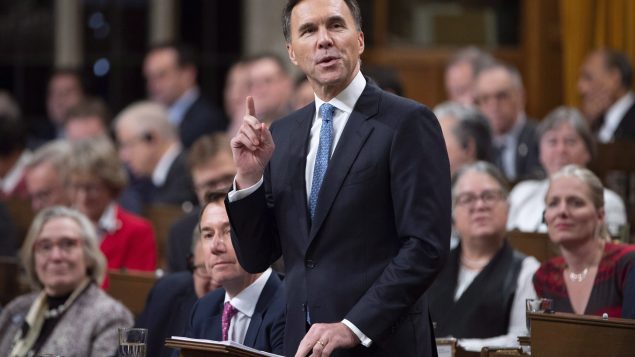The Liberal government says it is ready to spend billions to help Canadian companies compete with their U.S. counterparts.
In his fall fiscal update delivered Wednesday, Finance Minister Bill Morneau warned that while the Canadian economy continues to grow better than expected, if faces new challenges requiring the government to step up its support for Canadian businesses even at the price of going deeper into red with no timeline for returning to a balanced budget.
The fall economic statement delivers $17.6 billion in new spending over six years — about $16.5 billion of it in foregone revenue to boost Canadian business productivity.
“We could have ignored the concerns of business leaders, decided not to make the investments and the changes that are part of the fall economic statement, and we would have had a lower deficit as a result,” Morneau said.
“To do so would be neither a rational response nor a responsible one.”
ListenResponse to Trump tax cuts
The measures are a direct response to deep corporate tax cuts offered to U.S. businesses earlier this year by President Donald Trump, who slashed corporate tax rates from 35 per cent to 21 per cent.
Andrew Grantham, senior economist with CIBC Capital Markets, said the Liberal government had no choice but to respond to Trump’s moves.
“With Canadian business capital spending growth already lagging the U.S. by 20 per cent since 2009, recent tax reform stateside looking to incentivize further investments there, and the oil sector looking down the barrel of lower prices, something had to be done to try and boost future investments,” Grantham wrote in a research note to clients.
Brian DePratto, senior economist with TD Bank, said the government’s response to U.S. tax changes took the form of two major initiatives.
The first allows firms to write off 100 per cent of the cost of manufacturing equipment, clean energy equipment, and software, DePratto said.
The government also significantly raised the allowance for spending on computers.
The second part of the government initiative effectively tripled the speed at which businesses can write off capital costs not covered in the first change.
‘Relatively small fiscal cost’
All these measures come with a price tag, DePratto said. Roughly $16 billion in net new spending is envisioned, with tax changes making up the bulk.
It is estimated that the changes announced by the Liberals will cost the federal treasury around $4.9 billion in 2019/20 and about $3.8 billion in the 2020/21 fiscal year.
“Temporary, targeted tax measures like those introduced today have the advantage of encouraging new investment at a relatively small fiscal cost, particularly when compared with more broad-based tax cuts,” DePratto wrote in a research note.
“While difficult to assess immediately, we expect these changes should be at least marginally positive for business investment in Canada going forward.”
NDP finance critic Peter Julian said the government’s mini-budget had nothing in it for regular Canadians, arguing the new competiveness incentive measures will allow corporations to write-off big purchases like “a corporate jet” or a “plush limousine.”
Conservative finance critic Pierre Poilievre condemned the Liberals for not showing any path back to a balanced budget.
“If the government had not blown all of the good fortune that landed on its lap in the early days, they would be able to provide tax relief to businesses and Canadians without borrowing to pay for it,” Poilievre said.
With files from CBC News and The Canadian Press







For reasons beyond our control, and for an undetermined period of time, our comment section is now closed. However, our social networks remain open to your contributions.